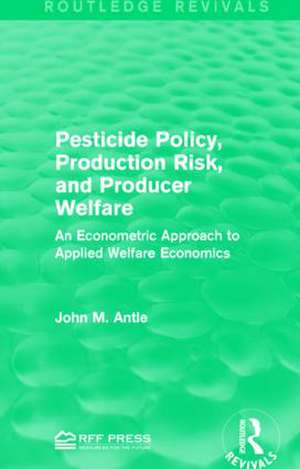Pesticide Policy, Production Risk, and Producer Welfare: An Econometric Approach to Applied Welfare Economics: Routledge Revivals
Autor John M. Antleen Limba Engleză Paperback – 24 feb 2017
| Toate formatele și edițiile | Preț | Express |
|---|---|---|
| Paperback (1) | 416.22 lei 6-8 săpt. | |
| Taylor & Francis – 24 feb 2017 | 416.22 lei 6-8 săpt. | |
| Hardback (1) | 776.92 lei 6-8 săpt. | |
| Taylor & Francis – 28 iul 2015 | 776.92 lei 6-8 săpt. |
Din seria Routledge Revivals
- 9%
 Preț: 903.80 lei
Preț: 903.80 lei -
 Preț: 200.66 lei
Preț: 200.66 lei -
 Preț: 341.55 lei
Preț: 341.55 lei - 9%
 Preț: 767.40 lei
Preț: 767.40 lei -
 Preț: 381.17 lei
Preț: 381.17 lei -
 Preț: 374.02 lei
Preț: 374.02 lei - 9%
 Preț: 934.94 lei
Preț: 934.94 lei - 8%
 Preț: 418.23 lei
Preț: 418.23 lei -
 Preț: 342.36 lei
Preț: 342.36 lei -
 Preț: 200.18 lei
Preț: 200.18 lei -
 Preț: 256.94 lei
Preț: 256.94 lei -
 Preț: 294.53 lei
Preț: 294.53 lei -
 Preț: 258.66 lei
Preț: 258.66 lei -
 Preț: 368.93 lei
Preț: 368.93 lei -
 Preț: 258.66 lei
Preț: 258.66 lei -
 Preț: 286.98 lei
Preț: 286.98 lei -
 Preț: 326.26 lei
Preț: 326.26 lei -
 Preț: 616.29 lei
Preț: 616.29 lei - 9%
 Preț: 764.34 lei
Preț: 764.34 lei -
 Preț: 737.40 lei
Preț: 737.40 lei -
 Preț: 294.91 lei
Preț: 294.91 lei -
 Preț: 294.91 lei
Preț: 294.91 lei -
 Preț: 267.15 lei
Preț: 267.15 lei -
 Preț: 309.94 lei
Preț: 309.94 lei -
 Preț: 295.04 lei
Preț: 295.04 lei -
 Preț: 257.67 lei
Preț: 257.67 lei -
 Preț: 294.72 lei
Preț: 294.72 lei -
 Preț: 245.10 lei
Preț: 245.10 lei -
 Preț: 258.52 lei
Preț: 258.52 lei -
 Preț: 230.80 lei
Preț: 230.80 lei -
 Preț: 246.37 lei
Preț: 246.37 lei -
 Preț: 258.66 lei
Preț: 258.66 lei -
 Preț: 259.47 lei
Preț: 259.47 lei -
 Preț: 230.80 lei
Preț: 230.80 lei - 18%
 Preț: 695.85 lei
Preț: 695.85 lei -
 Preț: 315.88 lei
Preț: 315.88 lei -
 Preț: 153.81 lei
Preț: 153.81 lei - 9%
 Preț: 903.41 lei
Preț: 903.41 lei -
 Preț: 349.80 lei
Preț: 349.80 lei - 9%
 Preț: 1004.17 lei
Preț: 1004.17 lei -
 Preț: 308.78 lei
Preț: 308.78 lei - 9%
 Preț: 605.71 lei
Preț: 605.71 lei -
 Preț: 296.10 lei
Preț: 296.10 lei -
 Preț: 737.40 lei
Preț: 737.40 lei - 9%
 Preț: 606.35 lei
Preț: 606.35 lei - 9%
 Preț: 729.99 lei
Preț: 729.99 lei -
 Preț: 295.62 lei
Preț: 295.62 lei -
 Preț: 382.23 lei
Preț: 382.23 lei -
 Preț: 343.21 lei
Preț: 343.21 lei -
 Preț: 741.10 lei
Preț: 741.10 lei
Preț: 416.22 lei
Nou
Puncte Express: 624
Preț estimativ în valută:
79.68€ • 81.99$ • 67.17£
79.68€ • 81.99$ • 67.17£
Carte tipărită la comandă
Livrare economică 01-15 martie
Preluare comenzi: 021 569.72.76
Specificații
ISBN-13: 9781138944237
ISBN-10: 1138944238
Pagini: 148
Dimensiuni: 138 x 216 x 8 mm
Greutate: 0.45 kg
Ediția:1
Editura: Taylor & Francis
Colecția Routledge
Seria Routledge Revivals
Locul publicării:Oxford, United Kingdom
ISBN-10: 1138944238
Pagini: 148
Dimensiuni: 138 x 216 x 8 mm
Greutate: 0.45 kg
Ediția:1
Editura: Taylor & Francis
Colecția Routledge
Seria Routledge Revivals
Locul publicării:Oxford, United Kingdom
Public țintă
Postgraduate, Professional, and UndergraduateCuprins
Acknowledgements; 1. Introduction 2. An Overview of the Issues 3. Theoretical Foundations 4. Econometric Measurement of Producer Efficiency and Welfare 5. A Case Study: California Processing-Tomato Production 6. Summary and Conclusions; References
Descriere
This title, first published in 1988, includes an application of the author’s methodology to tomato production, in which Antle illuminates the roles that alternative methods of pest management play in producer welfare. He also develops a more general empirical framework for studying producer welfare under uncertainty – a framework in which production risk, sequential decision making, and attitudes toward risk are integrated. This title will be of interest to students of environmental studies.
